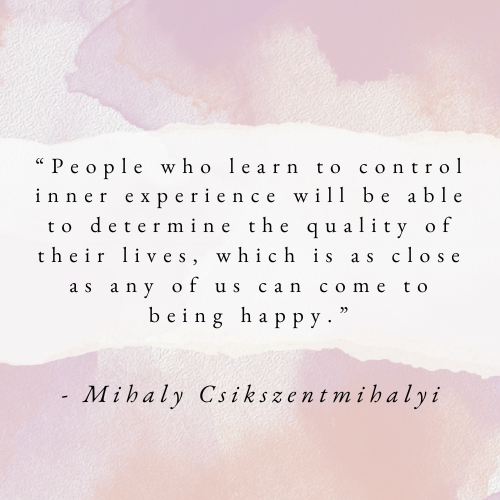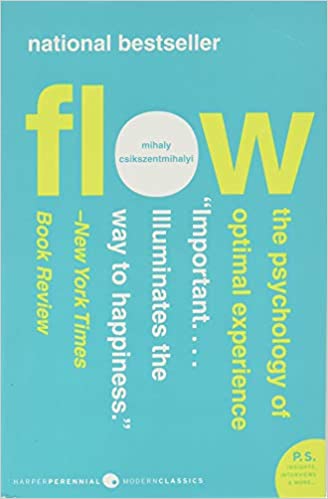Words of Wisdom from Flow: The Psychology of Optimal Experience by Mihaly Csikszentmihalyi

My greatest learning from Flow: The Psychology of Optimal Experience by Mihaly Csikszentmihalyi is the powerful role our mind plays in determining “good” or “bad” experiences. Csikszentmihalyi presents a number of examples and case-studies throughout the book that demonstrate how our happiness and sense of accomplishment is linked to our growth from overcoming challenges and doing hard things. We should not shy away from challenges or adversity, rather look at these hurdles as opportunities to learn and grow. Here are some of my other learnings:
1. The best moments in our lives are the challenging ones
“Contrary to what we usually believe, moments like these, the best moments in our lives, are not the passive, receptive, relaxing times—although such experiences can also be enjoyable, if we have worked hard to attain them. The best moments usually occur when a person’s body or mind is stretched to its limits in a voluntary effort to accomplish something difficult and worthwhile. Optimal experience is thus something that we make happen. For a child, it could be placing with trembling fingers the last blockon a tower she has built, higher than any she has built so far; for a swimmer, it could be trying to beat his own record; for a violinist, mastering an intricate musical passage. For each person there are thousands of opportunities, challenges to expand ourselves.”
2. Learn how to transform adversity into an enjoyable challenge
“Of all the virtues we can learn no trait is more useful, more essential for survival, and more likely to
improve the quality of life than the ability to transform adversity into an enjoyable challenge.”
3. Success is the side-effect of dedication to a cause greater than oneself
“…success, like happiness, cannot be pursued; it must ensue…as the unintended side-effect of one’s
personal dedication to a cause greater than oneself.”
4. Learn how to control the way you perceive life
“People who learn to control inner experience will be able to determine the quality of their lives, which is
as close as any of us can come to being happy.”
5. You will get the most out of a task by giving it your full attention
“Attention is like energy in that without it no work can be done, and in doing work is dissipated. We create ourselves by how we use this energy. Memories, thoughts and feelings are all shaped by how use it. And it is an energy under control, to do with as we please; hence attention is our most important tool in the task of improving the quality of experience.”
6. Be competitive for the right reasons
“Competition is enjoyable only when it is a means to perfect one’s skills; when it becomes an end in itself,
it ceases to be fun.”
7. Use writing to express yourself
“writing gives the mind a disciplined means of expression.”
8. Our happiness and state of mind is determined by our inner harmony, not external forces
“How we feel about ourselves, the joy we get from living, ultimately depends directly on how to the mind
filters and interprets everyday experiences. Whether we are happy depends on inner harmony, not on the controls we are able to exert over the great forces of the universe. Certainly we should keep on learning how to master the external environment, because our physical survival may depend on it. But such mastery is not going to add one jot to how good we as individuals feel, or reduce the chaos of the world as we experience it. To do that we must learn to achieve mastery over consciousness itself.”
9. The secret to succeeding in life AND enjoying it lies in one’s ability to persevere, despite obstacles or set-backs
“A person can make himself happy, or miserable, regardless of what is actually happening “outside,”
just by changing the contents of consciousness. We all know individuals who can transform hopeless situations into challenges to be overcome, just through the force of their personalities. This ability to persevere despite obstacles and setbacks is the quality people most admire in others, and justly so; it is probably the most important trait not only for succeeding in life, but for enjoying it as well.”

